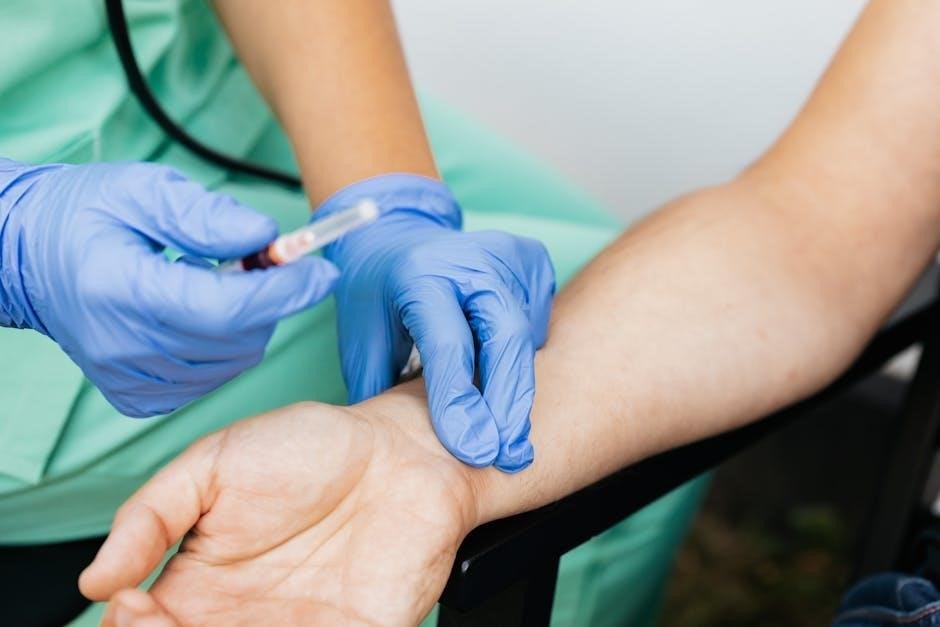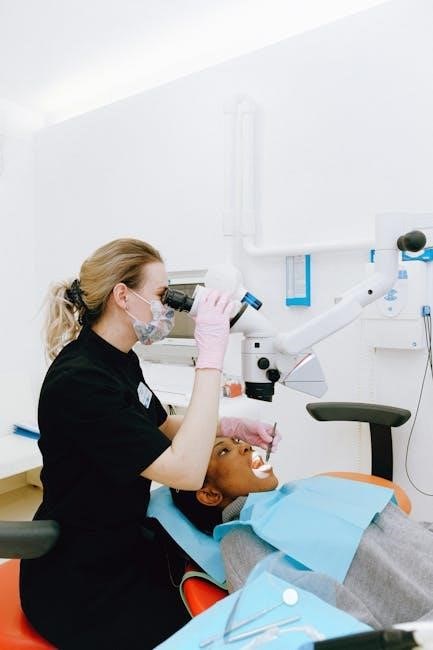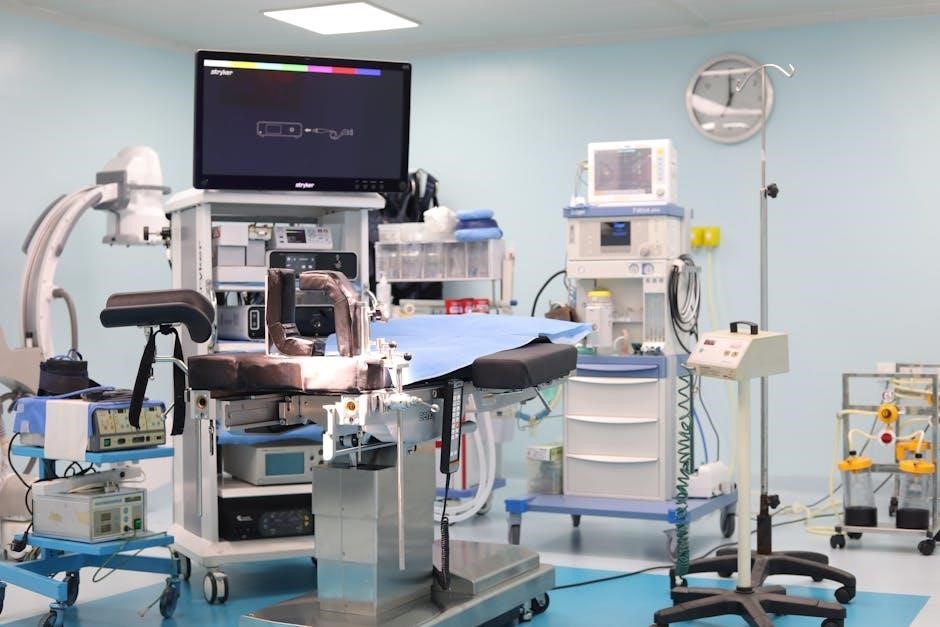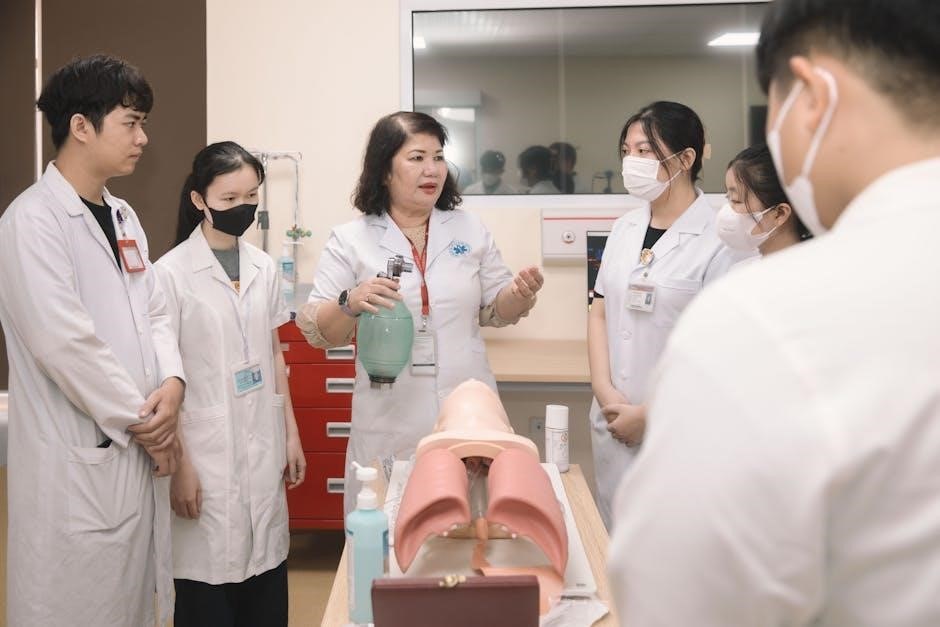epidemiology for the advanced practice nurse demetrius porche pdf
Epidemiology is the scientific study of disease distribution and determinants in populations. Advanced practice nurses use epidemiologic principles to improve health outcomes, prevent diseases, and promote wellness.

1.1 Definition and Scope of Epidemiology in Nursing Practice
Epidemiology is the study of disease distribution and determinants in populations, guiding nurses to understand health trends and risk factors. In nursing practice, it involves analyzing data to identify patterns, causes, and outcomes of health issues. This scientific approach enables nurses to develop targeted interventions, improving population health. The scope includes assessing disease incidence, prevalence, and determinants, informing evidence-based decisions. Advanced practice nurses use epidemiology to design preventive strategies, evaluate outcomes, and advocate for policies promoting health equity. It bridges clinical practice with public health, empowering nurses to address health disparities effectively.
1.2 The Role of Advanced Practice Nurses in Population Health
Advanced practice nurses play a pivotal role in population health by applying epidemiologic principles to improve community outcomes. They assess population needs, identify health disparities, and develop targeted interventions. By analyzing epidemiologic data, they inform evidence-based practices, advocate for policy changes, and promote health equity. Their role extends to educating communities, preventing diseases, and managing chronic conditions. Collaboration with interdisciplinary teams enables them to address complex health issues effectively. Ultimately, advanced practice nurses are instrumental in translating epidemiologic insights into actionable strategies that enhance population health and reduce health inequities, aligning with the broader goals of public health.
1.3 Overview of Demetrius Porche’s Contributions to Nursing Epidemiology
Demetrius Porche, DNS, PhD, ANEF, FACHE, FAANP, FAAN, is a prominent figure in nursing epidemiology, renowned for his work in population health and epidemiology education. His book, Epidemiology for the Advanced Practice Nurse: A Population Health Approach, provides a comprehensive framework for integrating epidemiologic principles into nursing practice. Porche’s contributions emphasize the practical application of epidemiology in understanding disease distribution and determinants, particularly in vulnerable populations. His work bridges academia, research, and clinical practice, equipping advanced practice nurses with the tools to address health disparities and improve community health outcomes. Porche’s efforts have significantly advanced the field, making him a respected leader in nursing epidemiology.

Core Principles of Epidemiology
Epidemiology examines the distribution and determinants of health events, diseases, and risk factors in populations. It provides a scientific foundation for understanding and addressing health issues.
2.1 The Epidemiologic Triangle: Host, Agent, and Environment
The epidemiologic triangle is a fundamental model in epidemiology, consisting of three components: the host, the agent, and the environment. The host refers to the human or animal that harbors the disease. The agent is the cause of the disease, such as a bacteria, virus, or chemical. The environment includes physical, biological, and social factors that facilitate disease transmission. Understanding this triangle helps advanced practice nurses identify and intervene in disease processes effectively, targeting each component to prevent and control health issues within populations.
2.2 Measures of Disease Frequency: Incidence and Prevalence
In epidemiology, incidence and prevalence are key measures of disease frequency. Incidence refers to the number of new cases occurring within a specific time period, providing insights into disease risk. Prevalence, in contrast, measures the total number of existing cases, including both new and ongoing cases, at a given time. These metrics are essential for understanding disease patterns, planning public health interventions, and evaluating the effectiveness of prevention strategies. Advanced practice nurses use these measures to assess population health needs and design targeted interventions to reduce disease burden in communities.
2.3 Epidemiologic Study Designs: Observational and Experimental
Epidemiologic study designs are categorized into observational and experimental methods. Observational studies involve analyzing data without intervening, such as cohort, case-control, and cross-sectional designs, to identify patterns and associations. Experimental studies, like randomized controlled trials, involve interventions to assess causality and effectiveness. Advanced practice nurses utilize these designs to investigate disease causes, evaluate interventions, and inform evidence-based practices. Understanding these methods is crucial for applying epidemiologic principles to improve population health outcomes and develop targeted interventions in clinical and community settings.

Population Health Framework in Nursing Practice
Population health frameworks guide nurses in improving health outcomes by addressing health trends, risk factors, and interventions within diverse communities, emphasizing evidence-based care and preventive strategies.
3.1 Understanding Population Health and Its Relevance to Nursing
Population health focuses on understanding health trends and determinants within specific groups. Nurses play a crucial role in applying this knowledge to design interventions that address health disparities and promote equity.
3.2 The Role of Epidemiology in Health Promotion and Disease Prevention
Epidemiology is essential in identifying risk factors and trends, enabling nurses to develop targeted health promotion strategies. By analyzing disease patterns, nurses can implement preventive measures, such as vaccinations and education campaigns, to reduce morbidity. Epidemiologic data guide the creation of evidence-based interventions, ensuring resources are allocated effectively. Advanced practice nurses, informed by epidemiology, play a vital role in promoting healthy behaviors and preventing disease outbreaks, ultimately improving community health outcomes. This approach aligns with the principles outlined in Demetrius Porche’s work, emphasizing the integration of epidemiology into nursing practice for sustainable health solutions.
3.3 Applying Population Health Principles in Clinical Settings
Advanced practice nurses apply population health principles in clinical settings by integrating epidemiologic data into patient care. This involves assessing community health needs, identifying high-risk populations, and tailoring interventions to address disparities. Nurses use epidemiologic insights to develop personalized care plans, promoting preventive measures such as screenings and vaccinations. By leveraging population health data, they can address the social determinants of health, enhancing health equity. This approach, as highlighted in Porche’s work, ensures that clinical practice is evidence-based, culturally sensitive, and focused on improving overall population health outcomes while managing individual patient care effectively.

Practical Applications of Epidemiology for Nurses
Nurses apply epidemiology in community assessments, data analysis, and developing interventions. They use epidemiologic data to inform evidence-based practice, address health disparities, and shape public health policies effectively.
4.1 Conducting Community Health Assessments
Community health assessments are critical for identifying health needs and priorities. Nurses use epidemiologic data to evaluate disease patterns, risk factors, and health disparities. By analyzing incidence and prevalence rates, they inform targeted interventions. These assessments guide resource allocation and policy development, ensuring equitable care. Advanced practice nurses play a key role in leading these efforts, leveraging epidemiologic principles to address population health challenges effectively. This process underscores the importance of evidence-based practice in improving community well-being and reducing health inequities.
4.2 Using Epidemiologic Data to Inform Evidence-Based Practice
Epidemiologic data is essential for evidence-based practice, enabling nurses to identify disease trends, risk factors, and health disparities. By analyzing incidence and prevalence rates, nurses can develop targeted interventions. This data informs clinical guidelines, policy decisions, and program evaluations. Advanced practice nurses apply epidemiologic findings to design effective care strategies, improving patient outcomes. The integration of this data ensures that practices are grounded in scientific evidence, addressing real-world health challenges effectively. This approach fosters better decision-making and enhances the quality of care delivered in various clinical and community settings.
4.3 Developing Interventions to Address Health Disparities
Epidemiologic data identifies health disparities, guiding the development of targeted interventions. Advanced practice nurses use this information to design culturally competent strategies, addressing the unique needs of vulnerable populations. Interventions may include community-based programs, education, and policy advocacy. By collaborating with interdisciplinary teams, nurses can implement evidence-based solutions to reduce inequities in healthcare access and outcomes. These interventions aim to promote health equity, improve quality of life, and empower communities. Addressing health disparities requires a proactive approach, leveraging epidemiologic insights to create sustainable and impactful change.

Emerging Trends in Epidemiology

Emerging trends include the integration of advanced technologies, global health challenges, and the impact of pandemics like COVID-19, reshaping epidemiologic practices and nurse roles.
5.1 The Impact of COVID-19 on Epidemiologic Practice
COVID-19 significantly transformed epidemiologic practice, emphasizing real-time data collection and digital surveillance tools. It highlighted the importance of rapid dissemination of epidemiologic findings to inform policy and public health responses. Advanced practice nurses played a crucial role in applying epidemiologic principles to manage outbreaks, track disease spread, and develop targeted interventions. The pandemic also underscored the need for global collaboration and equitable access to healthcare resources. These experiences have reshaped how epidemiology is applied in clinical and community settings, particularly in addressing health disparities and preparing for future public health crises.
5.2 Advances in Technology and Data Analysis in Epidemiology
Recent advancements in technology and data analysis have revolutionized epidemiology, enabling faster and more accurate disease tracking. Tools like artificial intelligence, machine learning, and big data analytics now predict trends and identify risk factors. Geographic information systems (GIS) map disease spread, while electronic health records (EHRs) and mobile health apps improve data accessibility. These innovations allow advanced practice nurses to make data-driven decisions, enhancing population health outcomes. However, challenges like data privacy and disparities in technology access remain critical considerations in leveraging these tools effectively.
5.3 Global Health Challenges and the Role of Nurses
Global health challenges, such as pandemics, infectious diseases, and health disparities, require a coordinated response. Advanced practice nurses play a vital role in addressing these issues by applying epidemiologic knowledge to design interventions and advocate for equitable care. Nurses collaborate with international organizations to implement public health strategies, conduct community assessments, and educate populations on disease prevention. Their expertise in cultural competence and community engagement is crucial in tackling global health crises. By integrating epidemiology into practice, nurses contribute to improving health outcomes worldwide, addressing disparities, and strengthening healthcare systems in resource-limited settings.

The Role of Advanced Practice Nurses in Public Health Policy
Advanced practice nurses advocate for policy changes using epidemiologic evidence to address health disparities and improve population health, ensuring equitable care and evidence-based public health initiatives.
6.1 Advocating for Policy Changes Based on Epidemiologic Evidence
Advanced practice nurses play a critical role in advocating for policy changes by leveraging epidemiologic evidence to address health disparities and improve population health outcomes. By analyzing data on disease distribution and determinants, nurses can identify gaps in healthcare delivery and propose evidence-based solutions. Epidemiologic insights enable nurses to inform policymakers about the most effective interventions, ensuring that policies are grounded in scientific research. This advocacy not only promotes equity in healthcare access but also strengthens public health systems. Nurses’ expertise in population health, as highlighted in Demetrius Porche’s work, is essential for translating epidemiologic data into actionable policy changes that benefit communities.
6.2 Collaborating with Interdisciplinary Teams in Public Health
Advanced practice nurses are integral to interdisciplinary teams in public health, contributing epidemiologic expertise to address complex health issues. By collaborating with physicians, policymakers, and community leaders, nurses ensure comprehensive approaches to health challenges. Epidemiologic data guides these teams in identifying risk factors and implementing evidence-based interventions. Such partnerships foster innovative solutions, improve resource allocation, and enhance health equity. Demetrius Porche’s work emphasizes the importance of teamwork in translating epidemiologic findings into community-based strategies, ultimately strengthening public health systems and improving population outcomes through a unified, data-driven approach.
6.3 Ethical Considerations in Epidemiologic Research and Practice
Ethical considerations are paramount in epidemiologic research and practice, ensuring respect for human rights and dignity. Advanced practice nurses must adhere to principles like informed consent, confidentiality, and beneficence. Demetrius Porche’s work highlights the importance of cultural competence and avoiding harm when conducting studies, especially in vulnerable populations. Ethical guidelines also emphasize transparency in data collection and reporting. By upholding these standards, nurses maintain trust and integrity in their role as epidemiologic investigators, fostering equitable and responsible public health practices that prioritize the well-being of individuals and communities while advancing scientific knowledge.

Book Review: “Epidemiology for the Advanced Practice Nurse”
Demetrius J. Porche’s book provides a comprehensive guide to epidemiology for advanced practice nurses, focusing on population health and practical applications in community settings.
7.1 Key Features and Structure of the Book
Epidemiology for the Advanced Practice Nurse by Demetrius J. Porche is a graduate-level textbook that integrates epidemiology with population health. It is structured to address core principles, study designs, and practical applications. The book is divided into chapters that explore the epidemiologic triangle, measures of disease frequency, and emerging trends like COVID-19 impacts. Written for nurses by nurses, it emphasizes evidence-based practice and community health. The text is enhanced with case studies and real-world examples, making it a valuable resource for advanced practice nurses aiming to improve population health outcomes.
7.2 Target Audience and Relevance to Nursing Practice
This textbook is specifically designed for advanced practice nurses, particularly those pursuing graduate studies or working in population health. It equips nurses with the knowledge to apply epidemiologic principles in clinical and community settings. The content is highly relevant for nurses involved in health promotion, disease prevention, and addressing health disparities. By focusing on practical applications, the book enables nurses to analyze health trends, inform evidence-based practice, and develop interventions tailored to specific populations. Its nurse-centric approach ensures that the material is accessible and directly applicable to real-world nursing challenges.
7.3 Strengths and Limitations of the Textbook
The textbook is praised for its nurse-centric approach, providing clear, practical knowledge tailored to advanced practice nurses. It effectively integrates epidemiologic principles with population health, offering real-world applications. The inclusion of COVID-19’s impact highlights its relevance to contemporary challenges. However, its graduate-level focus may limit accessibility for less experienced nurses. Additionally, the text’s depth in nursing applications may not fully address interdisciplinary collaborations. While comprehensive, some users note the lack of supplementary digital resources, which could enhance learning. Overall, it remains a valuable resource for nurses seeking to advance their epidemiologic expertise in clinical and community settings.
Epidemiology for advanced practice nurses, as outlined by Demetrius Porche, emphasizes population health and evidence-based practice. Future directions include addressing emerging health challenges and advancing epidemiologic education.
8.1 The Evolving Landscape of Nursing Epidemiology
The field of nursing epidemiology is rapidly evolving, driven by global health challenges and technological advancements. The COVID-19 pandemic has underscored the importance of epidemiologic expertise in responding to public health crises. Advanced practice nurses are increasingly leveraging data analytics and digital tools to track disease trends and develop targeted interventions. This shift highlights the need for continuous education and adaptation to emerging threats. By integrating epidemiologic principles into practice, nurses play a pivotal role in shaping population health strategies and addressing health disparities. The future of nursing epidemiology lies in innovation, collaboration, and a commitment to evidence-based care.
8.2 The Importance of Continuous Education for Nurses
Continuous education is vital for advanced practice nurses to stay abreast of evolving epidemiologic knowledge and methodologies. The dynamic nature of public health challenges, such as pandemics and emerging diseases, necessitates lifelong learning. Nurses must engage in ongoing professional development to apply evidence-based practices effectively. This ensures they can address health disparities, interpret epidemiologic data accurately, and implement interventions informed by the latest research. By prioritizing education, nurses enhance their ability to contribute to population health and maintain their role as leaders in healthcare innovation and policy. This commitment to learning aligns with the principles outlined in Porche’s work.
8.3 calls to Action for Advanced Practice Nurses in Epidemiology
8.3 Calls to Action for Advanced Practice Nurses in Epidemiology
Advanced practice nurses must advocate for policies grounded in epidemiologic evidence to address health disparities. They should collaborate with interdisciplinary teams to design interventions that promote population health. Staying informed about emerging trends, such as COVID-19 impacts and technological advancements, is crucial. Nurses are urged to pursue continuous education and engage with resources like Porche’s textbook to enhance their epidemiologic expertise. By integrating evidence-based practices, they can lead innovative solutions in public health. Ethical considerations must guide all research and practice to ensure equitable and effective care.

Resources for Further Learning
Explore Demetrius Porche’s “Epidemiology for the Advanced Practice Nurse” for in-depth insights. Utilize recommended readings, online courses, and professional organizations to enhance your epidemiologic knowledge and skills.
9.1 Recommended Readings and Journals
Demetrius Porche’s “Epidemiology for the Advanced Practice Nurse” is a cornerstone text. Supplement with journals like American Journal of Public Health and Journal of Epidemiology. Explore Epidemiologic Reviews for in-depth analyses. Additionally, Nursing Outlook and Public Health Nursing offer insights into population health. Online platforms like RedShelf and Springer Publishing provide access to these resources. These readings and journals are essential for advancing knowledge in epidemiology and population health, offering evidence-based perspectives and practical applications for nurses.
9.2 Online Courses and Training Programs
Online courses and training programs in epidemiology are essential for advancing nursing practice. Platforms like Coursera and edX offer courses on epidemiology basics, study designs, and population health. RedShelf and Springer Publishing provide digital access to educational materials. These resources cover topics like disease distribution, risk factors, and intervention strategies. Nurses can enhance their skills in data analysis and health promotion through specialized modules. Continuous learning ensures nurses stay updated on emerging trends and evidence-based practices, enabling them to address public health challenges effectively. These programs are designed to fit the schedules of working professionals, promoting lifelong education and professional growth.
9.3 Professional Organizations for Nursing Epidemiology
Professional organizations play a vital role in advancing nursing epidemiology. The American Nurses Association (ANA) and the National Association of Nurse Practitioners in Women’s Health (NPWH) provide resources and networking opportunities. The Council of Graduate Education for Public Health supports education and research initiatives. These organizations offer members access to journals, conferences, and continuing education. They foster collaboration among nurses, epidemiologists, and public health professionals. Joining these organizations enhances professional development and staying updated on best practices in epidemiology. They are essential for advancing the field and addressing emerging health challenges effectively.
